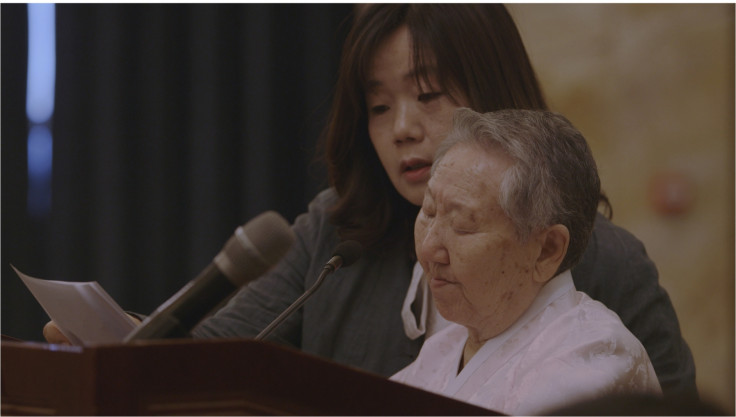The Apology tells story of WW2 'comfort women' – sex slaves of the Japanese military
Some Japanese officials continue to deny women were forced into sexual slavery during WW2.
A new film produced by the National Film Board of Canada has followed the personal journey of three 'comfort women', who were among more than 200,000 women kidnapped and raped by the Imperial Japanese Army during the Second World War.
Director Tiffany Hsiung spoke at London's Human Rights Watch Film Festival about how she interviewed the women, who are now in their 90s, to reveal how they were affected by events that happened over 70 years ago. Grandma Gil has attended weekly demonstrations in front of the Japanese embassy in Seoul every Wednesday for many years. A key activist in the fight for an official apology from the Japanese government, Grandma Gil presented a petition of 1.5m signatures to the United Nations.
One of the most harrowing moments in the film shows the animosity of young men during a demonstration in Japan, who hurled abuse at the women, shouting: "Go home, you Korean whores! F**k you, commies!"
Grandma Gil recounts how she was taken from Pyongyang, North Korea and gang-raped by Japanese soldiers when she was 13. She was infected with venereal diseases and suffered injuries so severe that she was unable to have children. Tragically, after the war in 1945, she was never returned home but sent to South Korea as the borders had closed between the two regions.
"Sadly, some in the Japanese government continue to deny the existence of comfort women or the plight they suffered at the hands of the Imperial Army," said Ed Royce, chairman of the foreign affairs committee of the US House of Representatives.
The Japanese government is involved in a lawsuit demanding the removal of a "comfort women" memorial statue in Glendale, California.
"It is equally egregious that the Japanese government continues to support efforts to force Glendale to remove this memorial to hundreds of thousands of victims of military sexual slavery," he said in a statement.
Although there are many Japanese deniers of comfort women, the euphemism for prostitutes, Nobutaka Shikanai, who served in the accounting division of the Imperial Japanese Army during the war, wrote about his work of staffing and opening "comfort stations".

In The Secret History After the War, he says: "When we procured the girls, we had to look at their endurance, how used up they were, whether they were good or not. We had to calculate the allotted time for commissioned officers, commanding officers, grunts, how many minutes. We also had to fix prices according to rank."
In December 2015, the Japanese and Korean governments stated that they had reached a "final, irreversible" resolution concerning the "comfort women" issue. However, many of the survivors rejected the agreement as they were not consulted on the terms of the agreement.
© Copyright IBTimes 2025. All rights reserved.






















